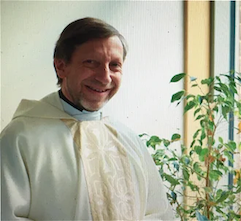Unfinished Dignity: Some Reflections On Dignitas Infinita

Fr Rob Esdaile - photo © Olivia Fabb
Amidst the rush of parish life there isn't usually much time to peruse Vatican documents. Nevertheless, I found time this Saturday, in the lull in the weekend storm (between morning confessions, homily-writing and evening Mass) to read through the recently published declaration, Dignitas Infinita, from the Dicastery for the Doctrine of the Faith.
The first thing that strikes me is the catalogue of re-writes rehearsed in the initial 'Presentation' of the document.
It began its journey five years ago in what was still the Congregation for the Doctrine of the Faith. The multiple revisions were needed "to meet a specific request of the Holy Father: namely, he explicitly urged that more attention be given to the grave violations of human dignity in our time, particularly in light of the Encyclical Fratelli Tutti." (Presentation paragraph 4) "A considerable process of maturation" sounds like it might be a euphemism for raised voices behind closed doors during the editorial process.
The second point of note is the sparse use of Scripture. Genesis 1.26-27 opens the biblical batting, predictably enough, in the eleventh paragraph of the main document, followed in short order by nine other Old Testament references together deemed to provide 'Biblical Perspectives'. A dozen instances of Jesus "affirming the value and dignity of all who bear the image of God, regardless of their social status and external circumstances" follow in #12. Gen 1.26 pops up again in #18, in support of the belief that the Creator has "imprinted the indelible features of his image on every person." Our calling to grow under the action of the Holy Spirit to reflect the glory of the Father in that same image and to share in eternal life" is established by a further four scripture references. (#21). And Gen 1.26 founds a Patristic distinction between the 'image' and 'likeness' of God in humanity (#22).
Gal 5.1 is quoted (alongside Ro 8.19ff) to uphold the Christian calling to work for the liberation of all. But one might have expected Gal 3.26-8 to have been brought into consideration in discussion of issues of gender, given how St Paul relativises sexual differences: "neither male nor female … but all are one in Christ Jesus." That Paul might have been appalled at the conclusions that could be drawn from that statement is neither here nor there.
Thereon in, the Vatican document is largely self-referential, citing dozens of Papal speeches and Vatican documents of the modern era in the footnotes, together with Boethius, Cicero, Aquinas, some Church Fathers, Giovanni Pico della Mirandola, a smattering of great theologians of the last two centuries (Newman, Rosmini, Maritain, Rahner, von Balathasar …) and one Jew, E. Levinas. Not a single contemporary secular voice makes the cut (in contrast with Pope Francis' own writings), nor any philosopher or psychologist or other scientist tussling with the complexities of the extremely important ethical matters being considered. It is hard to see how a creative work of theology can be built on such meagre scriptural foundations and with so little attempt to engage with contemporary thought.
Rather, the United Nations' 'Universal Declaration of Human Rights', 75 years old last December, is held up as the secular Gold Standard for reflection on human dignity (#23) because it upholds "the ontological dignity and the unique and eminent value of every man and woman in the world" (#2)- or perhaps as a ditch to die in in resisting contemporary attempts to tie 'human dignity' to individual autonomy or consciousness, as hailing from a time before "the proliferation of claims to new rights advanced by gender theory" (#59; cf. #56).
The distinction between moral, social, existential and ontological dignity (#7) is certainly a useful one. People can debase themselves by ignoring the demands of conscience. Poverty and oppression can crush people. Illness or personal circumstance can make people's lives "undignified" - and yet life should be received as an inalienable gift. And it is that insight into inalienable 'ontological dignity' which should cause us to fight to safeguard all these other levels of dignity for people everywhere: "The Defence of human dignity is based on the constitutive demands of human nature, which do not depend on individual arbitrariness or social recognition. Without such an objective basis, the concept of dignity becomes de facto subject to the most diverse forms of arbitrariness and power interests." (#25) Absolutely! The document has some very important things to say about how our common life needs to be organised in order to allow our brothers and sisters to flourish and about the social changes that safeguarding dignity demands. This is a never-ending journey: "Real and historical freedom always needs to be 'liberated'." (#31) Society, like Church, needs to be Semper Reformanda.
The document is particularly impassioned (as we would expect given the involvement of Pope Francis) in its denunciations of increasing poverty (and of new forms of poverty brought about by the combination of globalisation and increasing disparities within societies). (##36-7) Likewise Pope Francis' insistence that war is always "a defeat for humanity" and always against the logic of faith is repeated forcefully. (##38-9) In more or less summary form Dignitas Infinita then goes on to say important things about "the travail of migrants", human trafficking, sexual abuse and violence against women (including selective abortion - or 'femicide').
Stern words follow on procured abortion (quoting John Paul II's declaration in Evangelium Vitae that this is "the direct killing … of a human being in the initial phase of his or her existence"), on surrogacy, euthanasia and assisted suicide and the marginalisation of people with disabilities - who risk falling victim to our "throwaway culture" and yet who "prompt universal questions about what it means to be a human person". (#53)
Finally, the document reaches 'Gender Theory' and 'Sex Change'. It is a shame that the authors can't quite bring themselves directly to name anti-gay violence and discrimination even in the act of condemning it. (#55) Furthermore, one might argue that gender theory, rather than envisaging "a society without sexual differences", envisages a whole Smorgasbord of sexual differences (however problematic that might be). In any case, it is probably not gender theory or transsexuality which threatens "the anthropological basis of the family" so much as the falling birth-rate across the developed world, combined with our individualistic consumer culture, in which everyone is expected to 'invent' themselves. Of course, it would be unsurprising if there were some feedback loop at work here, with young people unsure about gender roles in a world in which they are bidden constantly by media and advertising to 'be who they want to be', but brittle over-insistence on a binary understanding of sex and gender is not likely to answer the need, either.
As we in the UK digest the Cass Report into the Tavistock Clinic and the NHS Gender Identity Service and as increasing numbers of parents struggle to support their offspring experiencing gender dysphoria, there are clearly more questions than answers around. Let us hope that the Vatican will listen to people's questions (and their experiences), to psychologists and to the findings of scientific and social-scientific research before it offers any further definitive answers.
The final "grave violation of human dignity" to which Dignitas Infinita refers is 'Digital Violence'. But it is strange that no mention is made of the spread of 'fake news', 'alternate truths' and Generative AI's ability to distort our vision of things, robbing us of an anchor in reality and setting individuals and groups against each other. Perhaps this section was written before Chatbot GPT had been unleashed.
That great muddying of the social media waters would alone justify a major teaching document exploring these ethical issues. But these 12,000 words aren't it. Dignitas Infinita is less Summa than bulletin-board. It is written in tones suited to inhouse consumption rather than being outward facing (although selected quotes will doubtless be used to grind various axes), although when it comes to the neuralgic issues around reproductive rights, Euthanasia and Gender, unfortunately Joe Public isn't very likely to be listening to the Magisterium.
So what is the document? A taming of a more fiery CDF first draft, perhaps? An assertion of Pope Francis' priorities ahead of the second session of the Synod (and ahead of forthcoming elections in the USA and around the world)? A gathering of his ethical legacy ready for the next conclave? Perhaps all of these things. Let us hope that it is also an invitation to a conversation - synodal, more about listening than speaking, seeking wisdom together, walking on the road to Emmaus across a land which, so often, seems to lack ethical maps.
Canon Rob Esdaile is parish priest of Woking and Knaphill in Arundel & Brighton Diocese.


















